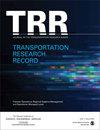Case Study on the Relationship Between Socio-Demographic Characteristics and Work-from-Home Behavior Before, During, and After the COVID-19 Pandemic
IF 1.8
4区 工程技术
Q3 ENGINEERING, CIVIL
引用次数: 0
Abstract
Many studies have explored the impact of the COVID-19 pandemic on work-from-home (WFH) behavior from different perspectives. However, it is rare to find studies focusing on how the newly adopted WFH practices will affect commuting patterns in the post-pandemic era. This study defines two mediation factors to capture the perceptions of pandemic severity and work environment at home and further investigates their impacts on future WFH adoption. This study utilizes a comprehensive survey and a path analysis method known as structural equation modeling (SEM) to explore the association between demographic factors, perception of COVID-related issues, and WFH behavior before, during, and after the pandemic. The results show that motherhood negatively affected WFH experiences in the before, during, and after periods of the pandemic. It was also found that being forced to WFH and mixing the working environment with their children made mothers less likely to WFH in the post-pandemic era. The results also show that older workers are less appreciative of the WFH approach and are less likely to continue to WFH in the post-pandemic era. The findings also confirmed the association between WFH during and after the pandemic with other factors, such as age and education. The positive or negative experiences with WFH during the pandemic will significantly shape workers’ decisions on continuing to WFH in the post-pandemic era. These findings could help transportation agencies understand the impacts of these factors on the choices of WFH during and, more importantly, after the pandemic era.COVID-19大流行之前、期间和之后社会人口统计学特征与在家工作行为关系的案例研究
许多研究从不同角度探讨了COVID-19大流行对在家工作行为的影响。然而,很少有研究关注新采用的WFH做法将如何影响大流行后时代的通勤模式。本研究定义了两个中介因素,以捕捉对流行病严重程度和家庭工作环境的看法,并进一步调查它们对未来WFH采用的影响。本研究利用综合调查和被称为结构方程模型(SEM)的路径分析方法,探讨人口因素、对covid - 19相关问题的看法以及大流行之前、期间和之后的WFH行为之间的关系。结果表明,在大流行之前、期间和之后,孕产对妇女家庭保健的经历产生了负面影响。研究还发现,在大流行后的时代,母亲被迫外出打工,并将工作环境与孩子混在一起,使她们不太可能外出打工。研究结果还表明,年龄较大的工人不太欣赏WFH方法,并且在大流行后时代不太可能继续WFH。研究结果还证实,在大流行期间和之后,WFH与年龄和教育等其他因素之间存在关联。大流行期间与卫生保健有关的积极或消极经历将在很大程度上影响工人在大流行后时代是否继续卫生保健的决定。这些发现可以帮助运输机构了解这些因素在大流行时期和更重要的是在大流行时期之后对WFH选择的影响。
本文章由计算机程序翻译,如有差异,请以英文原文为准。
求助全文
约1分钟内获得全文
求助全文
来源期刊

Transportation Research Record
工程技术-工程:土木
CiteScore
3.20
自引率
11.80%
发文量
918
审稿时长
4.2 months
期刊介绍:
Transportation Research Record: Journal of the Transportation Research Board is one of the most cited and prolific transportation journals in the world, offering unparalleled depth and breadth in the coverage of transportation-related topics. The TRR publishes approximately 70 issues annually of outstanding, peer-reviewed papers presenting research findings in policy, planning, administration, economics and financing, operations, construction, design, maintenance, safety, and more, for all modes of transportation. This site provides electronic access to a full compilation of papers since the 1996 series.
 求助内容:
求助内容: 应助结果提醒方式:
应助结果提醒方式:


